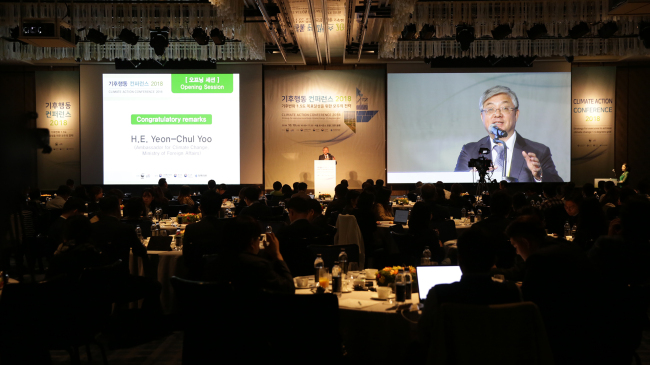‘Immediate actions from corporations, the public needed to limit global warming to 1.5 C’
Experts call for action at WWF Climate Action Conference 2018
By Jo He-rimPublished : Oct. 10, 2018 - 17:55
Paradigm changes are needed in all aspects of society to limit global warming to 1.5 degrees Celsius, and this should be an essential goal for corporations, experts said Wednesday.
At the Climate Action Conference 2018, hosted by World Wildlife Fund for nature Korea, about 250 environmental experts, government officials and business leaders gathered to discuss pathways to bring about practical changes and achieve decarbonization, following the recent adoption of the Special Report on Global Warming of 1.5 degrees Celsius by the Intergovernmental Panel on Climate Change.
At the Climate Action Conference 2018, hosted by World Wildlife Fund for nature Korea, about 250 environmental experts, government officials and business leaders gathered to discuss pathways to bring about practical changes and achieve decarbonization, following the recent adoption of the Special Report on Global Warming of 1.5 degrees Celsius by the Intergovernmental Panel on Climate Change.

“The IPCC’s special report strongly urges the world to take actions for climate change. And Korea is not an exception,” Simon Yoon, CEO of WWF Korea said in his opening speech, asking participants to take greater responsibility in the matter of environmental change.
Michael Reiterer, the EU ambassador to Korea, also called on policymakers to take the scientific report seriously.
The message from the IPCC to policymakers is a clear one, he said: It is necessary to follow the scientific guidance in the report. His advice for people over the age of 21 was to “really think about what kind of world you want to give to your children.”
The IPCC report, adopted Saturday at the IPCC’s 48th session held in Incheon, predicts grave consequences as a result of rising global temperatures. To prevent them, it states, global net human-caused emissions of carbon dioxide will need to fall by about 45 percent from 2010 levels by 2030, reaching “net zero” around 2050.
Climate Action Conference 2018 consisted of two sessions, which focused on the role of economic actors and energy transition.
Aromar Revi, a lead author of the IPCC’s special report, explained the key findings of the report and stressed the implications for fossil fuel-based economies.
The lead scientist on global climate and energy at WWF, Christopher Weber, discussed pathways for limiting global warming to 1.5 C.
The participants got a glimpse of the collaborative efforts being undertaken by governments and businesses from Ryuji Tsutsui, the CEO of WWF Japan. He also provided examples of the Science Based Targets Initiative, which seeks to lead the business world’s actions toward decarbonization. As of this year, some 500 companies, of which 100 are among the Fortune 500, have joined the SBT.
Professor Yun Sun-jin of Seoul National University also provided an evaluation of 33 electrical and transportation equipment companies in Korea to explain their short- and long-term goals set to take actions for climate change.
For example, Samsung Electronics has set goals to acquire 20 percent of the energy it uses from renewable sources by 2030, and Korea National Railroad plans to build 3MW solar power generation facility to operate its trains.
In the second session of the conference, Professor Hong Jong-ho, the chairman of Energy Transition Forum of Korea, gave an introduction to the opportunities and challenges in Korea’s energy transition. Kim Sung-woo, the head of Environment & Energy Research Institute, also addressed the issue of Climate-related Financial Disclosures, to promote understanding among stakeholders of carbon-related assets, and financial impacts of climate-related issues on businesses.
By Jo He-rim (herim@heraldcorp.com)







![[Graphic News] More Koreans say they plan long-distance trips this year](http://res.heraldm.com/phpwas/restmb_idxmake.php?idx=644&simg=/content/image/2024/04/17/20240417050828_0.gif&u=)
![[KH Explains] Hyundai's full hybrid edge to pay off amid slow transition to pure EVs](http://res.heraldm.com/phpwas/restmb_idxmake.php?idx=644&simg=/content/image/2024/04/18/20240418050645_0.jpg&u=20240419100350)






![[From the Scene] Monks, Buddhists hail return of remains of Buddhas](http://res.heraldm.com/phpwas/restmb_idxmake.php?idx=652&simg=/content/image/2024/04/19/20240419050617_0.jpg&u=20240419175937)

![[KH Explains] Hyundai's full hybrid edge to pay off amid slow transition to pure EVs](http://res.heraldm.com/phpwas/restmb_idxmake.php?idx=652&simg=/content/image/2024/04/18/20240418050645_0.jpg&u=20240419100350)

![[Today’s K-pop] Illit drops debut single remix](http://res.heraldm.com/phpwas/restmb_idxmake.php?idx=642&simg=/content/image/2024/04/19/20240419050612_0.jpg&u=)